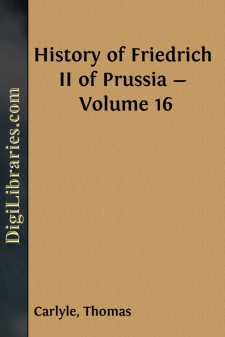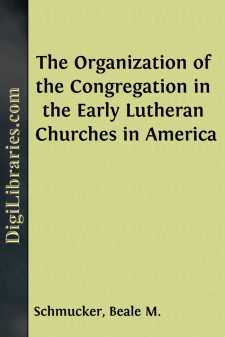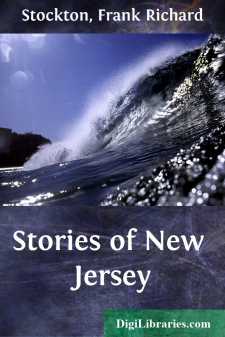History
- Africa 30
- Americas (North Central South West Indies) 50
- Ancient 68
- Asia 58
- Australia & New Zealand 8
- Canada 41
- Caribbean & West Indies 1
- Civilization 20
- Eastern Europe 12
- Europe 310
- Expeditions & Discoveries 60
- General 77
- Historical Geography 1
- Jewish 9
- Latin America 3
- Medieval 8
- Middle East 14
- Military 248
- Revolutionary 8
- Study & Teaching 5
- United States 353
- Western Europe 56
- World 13
History Books
Sort by:
by:
Joseph A. Seiss
LUTHER AND THE REFORMATION. A rare spectacle has been spreading itself before the face of heaven during these last months. Millions of people, of many nations and languages, on both sides of the ocean, simultaneously engaged in celebrating the birth of a mere man, four hundred years after he was born, is an unwonted scene in our world. Unprompted by any voice of authority, unconstrained by any...
more...
by:
Thomas Carlyle
Chapter I.—SANS-SOUCI. Friedrich has now climbed the heights, and sees himself on the upper table-land of Victory and Success; his desperate life-and-death struggles triumphantly ended. What may be ahead, nobody knows; but here is fair outlook that his enemies and Austria itself have had enough of him. No wringing of his Silesia from this "bad Man." Not to be overset, this one, by never such...
more...
SECTION XXXV.—VICTOR AMADEUS, KING OF SICILY. It is said that the King of Sicily is always in ill humour, and that he is always quarrelling with his mistresses. He and Madame de Verrue have quarrelled, they say, for whole days together. I wonder how the good Queen can love him with such constancy; but she is a most virtuous person and patience itself. Since the King had no mistresses he lives upon...
more...
The Organization of the Congregation in the Early Lutheran Churches in America. The Lutheran Church in this country has had an opportunity, as never before in its history, to determine for itself the whole form of its organization, uncontrolled by any external forces. In the old world the intimate and organic union of the church with the State left little liberty in this respect. When, therefore, the...
more...
by:
Filson Young
The writing of historical biography is properly a work of partnership, to which public credit is awarded too often in an inverse proportion to the labours expended. One group of historians, labouring in the obscurest depths, dig and prepare the ground, searching and sifting the documentary soil with infinite labour and over an area immensely wide. They are followed by those scholars and specialists in...
more...
by:
Richard Hakluyt
PRINCIPALL SECRETARIE TO HER MAIESTIE, MASTER OF THE COURT OF WARDES AND LIUERIES, AND ONE OF HER MAIESTIES MOST HONOURABLE PRIUIE COUNSELL. Right Honorable, hauing newly finished a Treatise of the long Voyages of our Nation made into the Leuant within the Streight of Gibraltar, and from thence ouer-land to the South and Southeast parts of the world, all circumstances considered, I found none to whom I...
more...
by:
Emma Helen Blair
Preface The scope of the present volume (1635–36) is mainly commercial and financial matters on the one hand, and ecclesiastical affairs on the other. The paternalistic tendencies of the Spanish government are obvious in the former direction, with various restrictions on trade, and annoying imposts on all classes of people. The Portuguese of Macao are accused of ruining the Chinese trade with the...
more...
by:
John McElroy
THE REBELS FORMALLY PROPOSE TO US TO DESERT TO THEM—CONTUMELIOUS TREATMENT OF THE PROPOSITION—THEIR RAGE—AN EXCITING TIME—AN OUTBREAK THREATENED—DIFFICULTIES ATTENDING DESERTION TO THE REBELS. One day in November, some little time after the occurrences narrated in the last chapter, orders came in to make out rolls of all those who were born outside of the United States, and whose terms of...
more...
by:
Allen Johnson
CHAPTER I. THE FIRST FIFTY YEARS Scarcely more than half a century has passed since the Dominion of Canada, in its present form, came into existence. But thrice that period has elapsed since the fateful day when Montcalm and Wolfe laid down their lives in battle on the Plains of Abraham, and the lands which now comprise the Dominion finally passed from French hands and came under British rule. The...
more...
The North American Indians, the earliest inhabitants of this country of whom we know anything definite, were great story-tellers; and their histories consist entirely of stories handed down from parents to children, or, more likely, from grandparents to grandchildren, for grandfathers and grandmothers are generally more willing to tell stories than fathers or mothers. And so these traditions, probably...
more...











